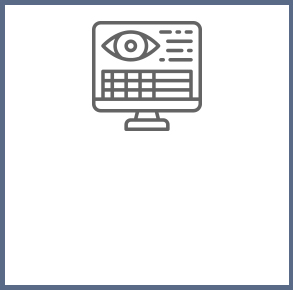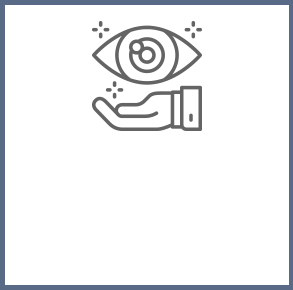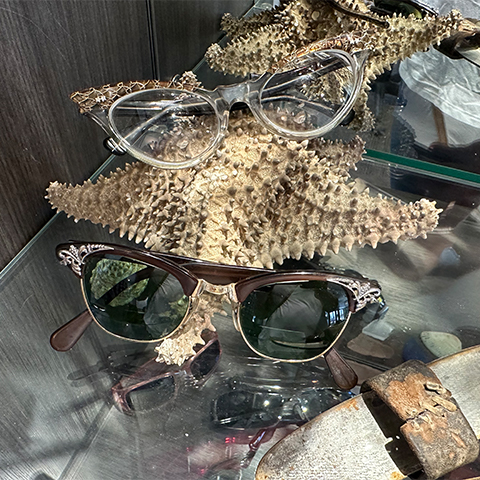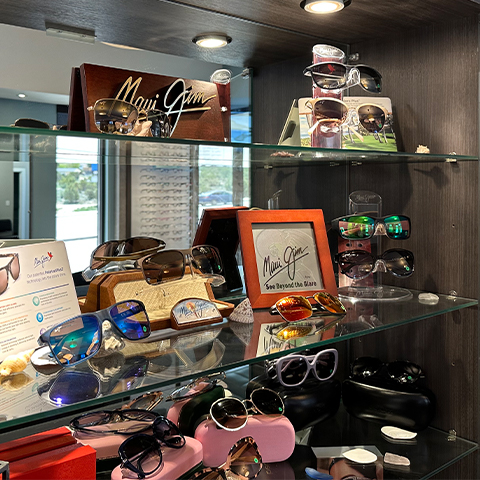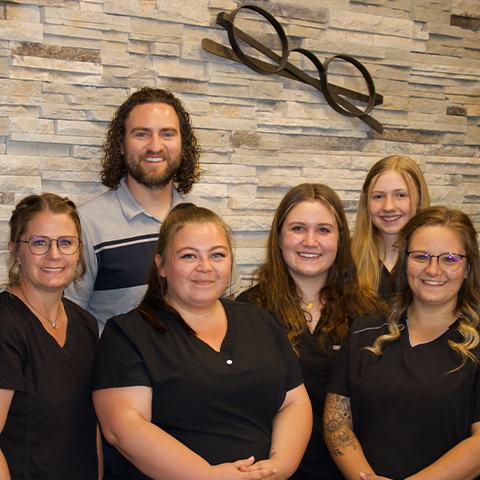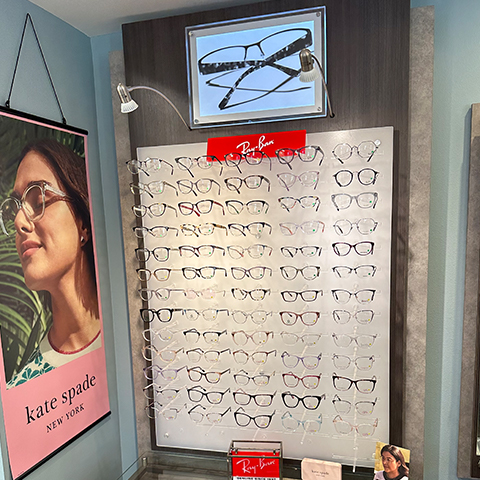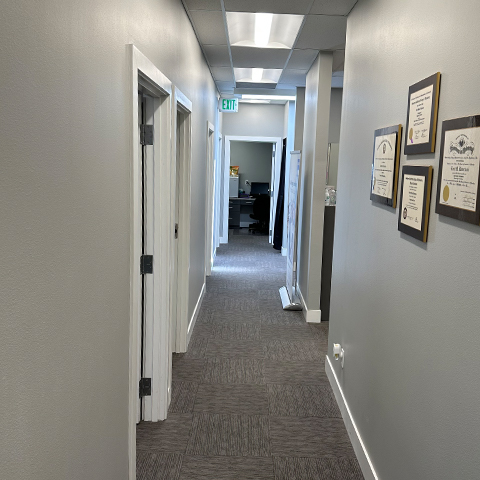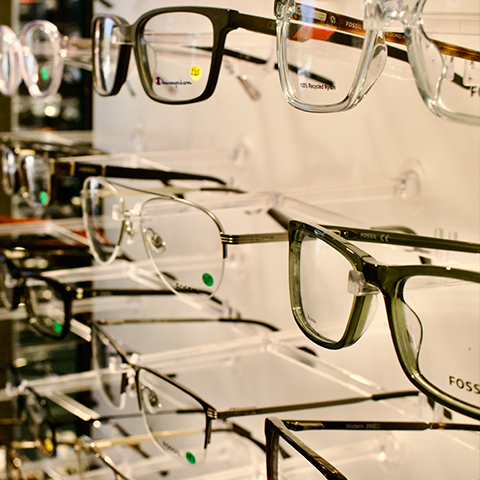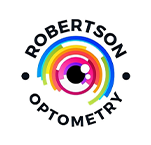Preserving Your Long-Term Vision
At Robertson Optometry, our eye disease diagnosis and management services are comprehensive. That means we offer glaucoma management, pre and post-op care for cataracts, diabetic eye disease evaluations, and we also monitor macular degeneration.
To deliver a full-scope experience, our team uses innovative technology such as the optomap, OCT, and visual field testing to get the complete picture of your eyes and vision.
From there, we can help prepare a customized treatment plan that addresses your unique visual needs.
Dr. Robertson and the rest of the team are experienced and driven to help you overcome eye disease. Schedule your comprehensive eye disease evaluation today.
Request AppointmentGetting an Early Look at Eye Disease
Consistent eye exams are important for a number of reasons beyond updating your prescription, including allowing our team to check for early signs of eye disease. The sooner we can examine your eyes for any issues, the sooner we can formulate a personalized treatment plan.
We aim to help you enjoy clear, healthy vision through timely exams and innovative technology.


The Different Forms of Eye Disease
Eye disease can be overwhelming to navigate and understand, but our team is here for you. We believe in helping educate our patients and providing comprehensive management and treatment services.
Eye disease can be overwhelming to navigate and understand, but our team is here for you. We believe in helping educate our patients and providing comprehensive management and treatment services.
Glaucoma Management
We offer comprehensive glaucoma management services by implementing OCT and visual field testing into our glaucoma exams.
Glaucoma is a group of eye conditions that cause damage to the optic nerve, which is responsible for sending visual information to your brain. Damage to the optic nerve can lead to vision loss and blindness if not detected and treated early.
Damage from glaucoma can be caused by high pressure in the eye, referred to as intraocular pressure. Age, family history, and previous eye injuries can all be contributing risk factors, and maintaining a regular exam schedule to monitor your vision is essential.
Pre & Post-Op Cataract Care
We offer pre-cataract surgery evaluation and post-op care. Our cataract evaluations include advanced retinal imaging through the optomap, and we partner with a surgeon who visits our clinic once a month to monitor cataract patients.
Cataracts develop when the normally clear lens of the eye becomes clouded and can include symptoms like blurry vision, dim or yellowed vision, and difficulty seeing at night. Cataracts begin forming when proteins in the eye form clumps that prevent the lens from sending clear images to the retina, the thin layer of tissue that lines the back of the eye.
If cataracts progress to a later stage and prevent you from going about your daily activities, such as reading or driving, cataract surgery is the effective option to remove them.
Age-Related Macular Degeneration (AMD)
AMD is a progressive disease that affects your central vision, damaging the macula. This damage can make things like reading and driving much more difficult. AMD is a leading cause of vision loss among older adults with 2 main forms:
- Dry AMD is the more common form of the disease and occurs in early, intermediate, and late stages. This form of AMD occurs when the macula thins with age.
- Wet AMD is the less common form of the disease and causes faster and more severe vision loss. Wet AMD occurs when abnormal blood vessels grow in the back of the eye and damage the macula.
We diagnose and monitor AMD with OCT scans and visual field testing technology to get a more detailed look at how it is affecting your vision. Consistent eye exams, adjusting your diet, and giving up smoking are also effective prevention methods for AMD.
Diabetic Eye Disease Evaluations
Diabetes affects more than your blood sugar—it can affect your vision too. Diabetes can also increase the risk of developing eye diseases such as glaucoma, cataracts, and diabetic retinopathy, which is the primary vision loss concern for patients with diabetes.
Some signs and symptoms of diabetic retinopathy can include blurry vision, a loss of central vision, and difficulty seeing at night.
Our diabetic eye disease evaluations implement advanced retinal imaging through optomap, OCT, and even visual field testing if needed to monitor the effects diabetes is having on your vision.
Cataracts
As you age, the clear lens of your eye can thicken and become opaque. This is called a cataract. They are often the result of the normal aging process, though there are cases where cataracts are present at birth.
Symptoms of Cataracts
Cataracts generally develop without pain or redness. Some symptoms of cataracts might include:
- Foggy or blurry vision
- Difficulty seeing at night
- Seeing halos around lights
- Muted color vision
- Sensitivity to light
Preventing Cataracts
Cataract growth can be slowed by protecting the eyes from UV rays—a great pair of sunglasses can help! Eating foods rich in antioxidants like blueberries, apples, artichokes, and dark green veggies like kale and broccoli may also help to prevent cataracts.
Cataract Treatment
Often, obstructions to vision as a result of cataracts can be remedied through corrective lenses. But, cataracts can increase in size and may get to a point where glasses or contact lenses no longer provide the vision you want. In this case, we may recommend surgery.
If you’re having difficulty driving or performing your job safely, are struggling to watch television or read, or are experiencing challenges with daily activities that decrease your quality of life, it might be time to explore surgery.
Cataract surgery is safe and effective, and we will help you understand the procedure and your options.
An Attention to Detail
As the destination for eye care in Ely, we strive to provide our patients with a full-scope optometry experience every time they visit us. Education is a big part of our practice, and before we implement treatment plans, we want our patients to understand the different forms of eye disease and the technology we use to help monitor them.
We offer everything in one place and can help you manage your eye health with a laser-focused attention to detail.
Our Technology
Understanding the different forms of eye disease is an important first step, but we also offer innovative technology to help ensure no shortcuts are taken when it comes to your vision. Our diagnostic technology helps our team detect signs of eye disease early and move quickly to help preserve your vision.
Optomap Retinal Imaging
The optomap uses a noninvasive scanning laser to create an incredibly detailed 200° image image of the inside of your eye. With optomap, our team can quickly and easily assess your overall eye health, identify any potential issues, and provide you with personalized treatment options.
Optomap is completely safe for patients of all ages, making it the perfect choice for families looking to prioritize their eye health. The optomap assists our team in monitoring macular degeneration, glaucoma, retinal tears or detachments, and even the effects of diabetes on your vision.
OCT
Optical coherence tomography (OCT) is a noninvasive imaging technology that produces a highly detailed 3D image of the inside of your eye. Using OCT, our team can quickly and easily assess the health of your retina and optic nerve, identify any potential issues, and provide you with personalized treatment options.
OCT allows us to see the layers of your retina to map and measure their thickness. These measurements can help us diagnose and manage eye diseases like glaucoma, age-related macular degeneration, and diabetic eye disease.
Visual Field Testing
Visual field testing is a noninvasive test that measures the full horizontal and vertical range of what you can see peripherally, helping our team detect any potential blind spots that could indicate eye health issues.
Visual field testing is efficient and crucial for the early detection and monitoring of eye diseases like glaucoma and macular degeneration. This type of testing can provide a clear map of your visual field, which can be helpful for our team when assessing your treatment options.
Taking a Closer Look at Your Vision
Our eye disease diagnosis and management services are designed to help capture all the details of your eyes and vision. We believe in having the complete picture before determining what treatment and management options are best for you.
Contact us to schedule your appointment today and get ahead of eye disease.
Request AppointmentVisit Our Location
You can find us on Great Basin Blvd., with plenty of parking available in front of the clinic. We look forward to welcoming you!
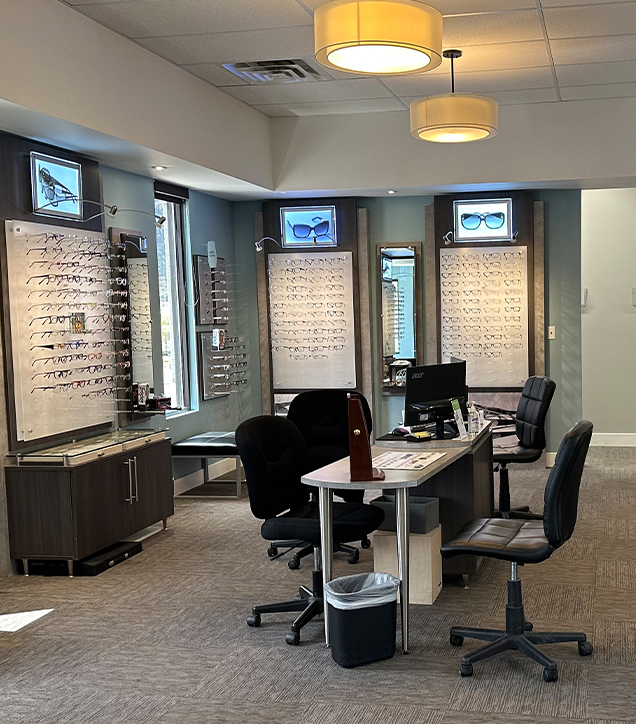
Our Address
- 1250 Great Basin Blvd
- Ely, NV 89301
Contact Information
- Phone: 775-289-2580
- Email: [email protected]
Hours of Operation
- Monday: 8:00 AM – 6:00 PM
- Tuesday: 8:00 AM – 6:00 PM
- Wednesday: 8:00 AM – 6:00 PM
- Thursday: 8:00 AM – 6:00 PM
- Friday: Closed
- Saturday: Closed
- Sunday: Closed
Our Brands







